Coordinación
Una coordinación sólida puede evitar vacíos y duplicaciones en las respuestas humanitarias, así como garantizar que los PTM complementen otros tipos de asistencia. Sin embargo, el informe del «Estado Global de los Programas de Transferencias Monetarias» de la CALP Network muestra que la coordinación de la asistencia en efectivo es vista como débil y ad hoc, y que esto está teniendo graves repercusiones operativas.
Los donantes, las ONG y los líderes de los grupos de trabajo de transferencias monetarias (GTM) han pedido claridad sobre tres temas principales relacionados con la coordinación de la asistencia en efectivo:
- Quién debe ser responsable de asegurar una coordinación eficaz de la asistencia en efectivo;
- Cuál es la función y el mandato de los grupos de trabajo de transferencias monetarias, incluso en relación con las transferencias monetarias multipropósito;
- Cómo se debe dotar de recursos a la coordinación de asistencia en efectivo.
Tenemos que basarnos urgentemente en lo que funciona y proporcionar claridad a nivel mundial sobre las preguntas arriba mencionadas, adaptándonos a los diferentes contextos. Hace mucho tiempo que se deberían haber tomado decisiones claras basadas en necesidades operativas y no en la política de las agencias.
Prioridades actuales
El objetivo de la CALP Network es contribuir a seguir progresando en este tema en tres niveles: apoyar a los grupos de trabajo de transferencias monetarias a nivel regional; contribuir a soluciones prácticas para la coordinación de la asistencia en efectivo a nivel mundial; y convocar una discusión basada en la evidencia sobre temas clave, destacando puntos de decisión críticos y oportunidades de progreso.
Contenido destacado

Cash Coordination Tip Sheet
Guidelines and Tools
This tip sheet sets out established best practice, key guidance and resources for all aspects of cash coordination, intended as a clear, accessible and action-oriented guide for those engaged in coordination of cash and voucher assistance (CVA) at the field level.

Introducing the Cash Coordination Tip Sheet
Webinar
The CALP Network has developed a tipsheet setting out established best practice and key guidance and resources for all aspects of cash coordination, intended as a clear, accessible and action-oriented guide for those engaged in coordination of cash and voucher assistance at the field level.

Cash Coordination: A proposal from members in MENA
Blog Post
Earlier this year the CALP Network undertook regional consultations to explore options for cash coordination. This blog lays out recommendations from participants from the Middle East and North Africa who sketched out what cash coordination, and coordination more broadly, could look like in future to support a more effective, efficient and accountable response.
Últimos recursos
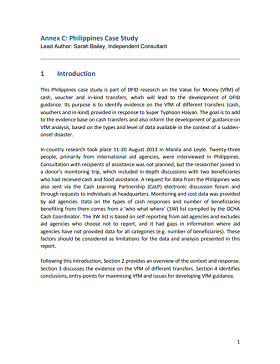
Annex C: Philippines Case Study
Report
This Philippines case study is part of DFID research on the Value for Money (VfM) of cash, voucher and in-kind transfers, which will lead to the development of DFID guidance. Its purpose is to identify evidence on the VfM of different transfers (cash, vouchers and in-kind) provided in response to Super...
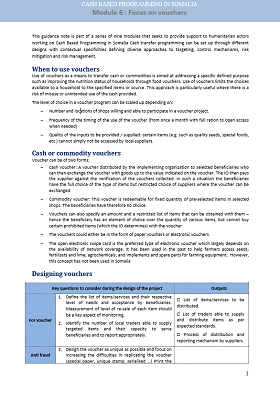
Cash Based Programming In Somalia – Module 6: Focus On Vouchers
Report
This guidance note is part of a series of nine modules that seeks to provide support to humanitarian actors working on Cash Based Programming in Somalia Cash transfer programming can be set up through different designs with contextual specificities defining diverse approaches to targeting, control...
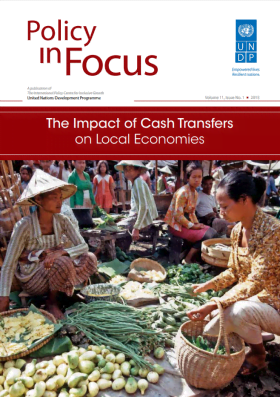
The Impact of Cash Transfers on Local Economies
Policy paper
In this special edition of Policy in Focus, leading authors and practitioners present their research on how cash transfers can impact the local economy when implemented in a developing country. The aim is to gather and review research results and evidence, obtained from various methodologies ranging from...
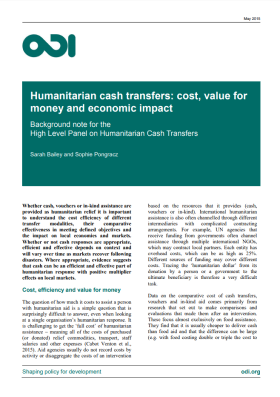
Humanitarian Cash Transfers: Cost, value for money and economic impact
Policy paper
The question of how much it costs to assist a person with humanitarian aid is a simple question that is surprisingly difficult to answer, even when looking at a single organisation’s humanitarian response. It is challenging to get the ‘full cost’ of humanitarian assistance – meaning all of the...

Notas de orientación sobre transferencias monetarias y medios de vida- Africa Occidental
Guía y herramientas
A raíz de los debates sobre el papel de las transferencias monetarias en el fortalecimiento de la resiliencia, la creciente aceptación de las transferencias en efectivo como herramienta intersectorial se ha visto acompañada de una mejor comprensión de este enfoque y de su potencial para romper el...

Integrating Gender throughout a Project’s Life cycle 2.0: A Guidance Document for International Development Organisations and Practitioners
Guidelines and Tools
The overarching premise of this document is that to conduct effective, responsible development work, incorporating gender at all stages of a project’s life cycle – from project design and proposal development to field implementation and monitoring, evaluation and learning – is critical. As such,...

Household Cash Transfer Assessment – Typhoon Haiyan Recovery Response
Report
An estimated 16.1 million people were affected by typhoon Haiyan, with 1.1 million damaged or destroyed homes and as many as 4.1 million people displaced – nearly four times as many as those left homeless by the 2004 Indian Ocean tsunami. At least 6,300 people lost their lives and another 5.9...

Key Recommendations for Protection in Cash-based Interventions
Guidelines and Tools
This document outlines the key recommendations to ensure that protection is mainstreamed throughout the project cycle for cash-based interventions.
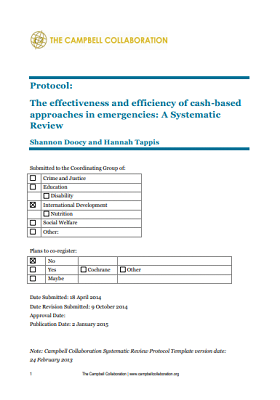
The Effectiveness and Efficiency of Cash-Based Approaches in Emergencies: A Systematic Review
Report
To access a document detailing the background, literature review, and objectives related to this review, please click here. Cash-based approaches have been used for development purposes for a number of decades, particularly within social protection interventions in low- and middle-income countries. Over...
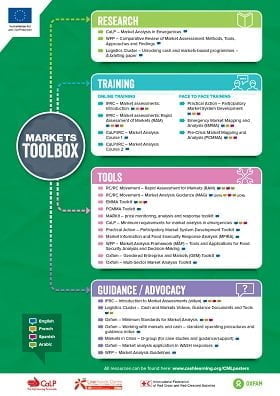
Markets Toolbox
Guidelines and Tools
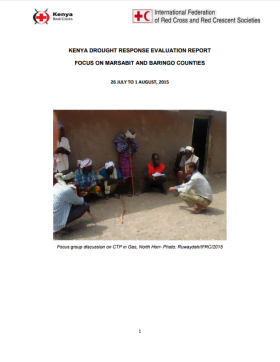
Kenya Drought Response Evaluation Report – Focus on Marsabit and Baringo Counties
Case Study
An evaluation of a drought response which involved school feeding, cash transfers and nutrition outreach activities.
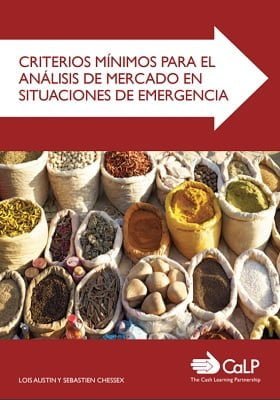
Criterios mínimos para el análisis de mercado en situaciones de emergencia
Guía y herramientas
El creciente consenso en los últimos años sobre el papel primordial que los mercados desempeñan en las intervenciones humanitarias ha propiciado el desarrollo de diversas herramientas y directrices para ayudar y guiar a las organizaciones humanitarias a la hora de realizar una evaluación de...

Guidelines on Cash Transfers and Livelihoods – Latin America
Report
This document, like the learning workshop that took place in Guatemala City on 16th and 17th November 2015, focuses primarily on the context in Central America. Due to the profile of the participants and the complex problems of the region (the Dry Corridor, high exposure to hurricanes, high levels of...
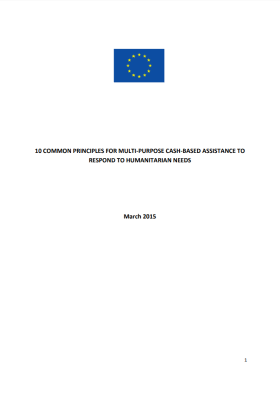
10 Common Principles for Multi-Purpose Cash-Based Assistance to Respond to Humanitarian Needs
Policy paper
These principles are intended to complement existing guidance on cash-based assistance and policy positions on those thematic areas which lend themselves to a multi-purpose approach. Donors and their partners are encouraged to take these principles into account in designing and implementing their...
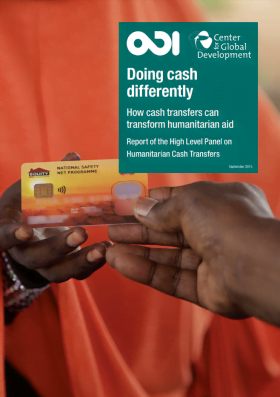
Doing Cash Differently: How cash transfers can transform humanitarian aid?
Policy paper
This report commissioned by the Overseas Development Institute highlights why giving aid directly in the form of cash is often a highly effective way to reduce suffering and to make limited humanitarian aid budgets go further. The publication, ,written by the High Level Panel on Humanitarian...

Markets in Crises: The 2010 Floods in Sindth, Pakistan
Case Study
Floods in Pakistan in 2010 inundated a wide swath of territory, affecting 18 million people and killing approximately 2,000. The disaster also affected businesses, from some of the largest factories and most fertile agricultural land in the country to small village shops. Many businesses closed, either...
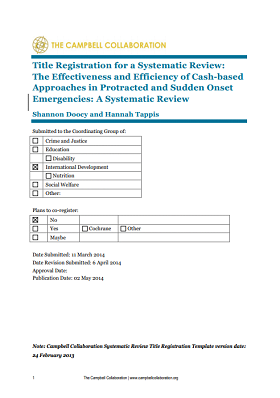
The Effectiveness and Efficiency of Cash-based Approaches in Emergencies: A Systematic Review (Background and Objectives)
Report
This document provides the background, literature review, and objects of the review itself, which is available here. Cash-based approaches have been used for development purposes for a number of decades, particularly within social protection interventions in low- and middle-income countries. Over the...

Part 1.2 The Minimum Expenditure Basket
Report
The Minimum Expenditure Basket (MEB) is defined as what a household requires in order to meet basic needs – on a regular or seasonal basis – and its average cost. Determining the MEB serves three functions: a) it is a holistic reflection of need as perceived by crisis affected populations, including...
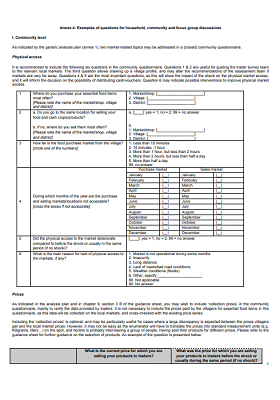
Annex 4: Examples of questions for household, community and focus group discussions
Report
It is recommended to include the following six questions in the community questionnaire. Questions 1 & 2 are useful for guiding the trader survey team to the relevant local markets. The third question allows drawing up a village profile, and may alter the recommendations of the assessment team if markets...
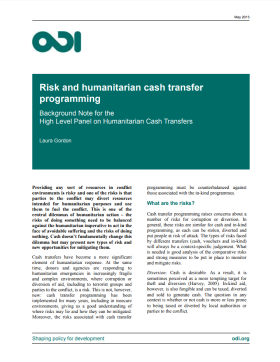
Risk and Humanitarian Cash Transfer Programming
Policy paper
Cash transfer programming raises concerns about a number of risks for corruption or diversion. Providing any sort of resources in conflict environments is risky and one of the risks is that parties to the conflict may divert resources intended for humanitarian purposes and use them to fuel the...